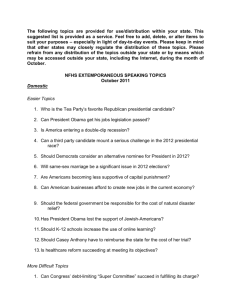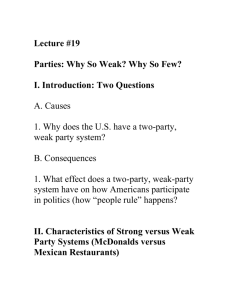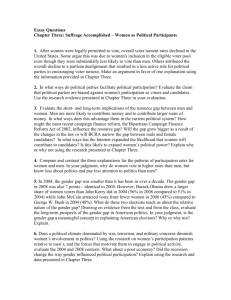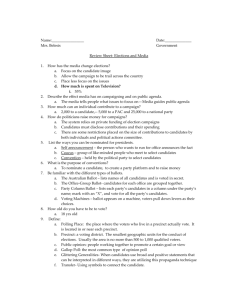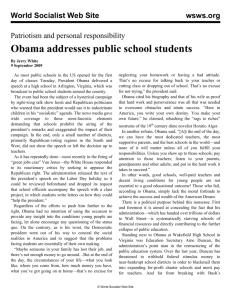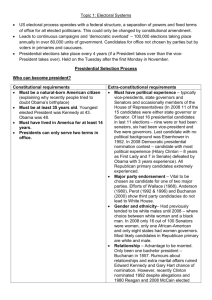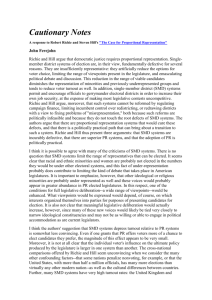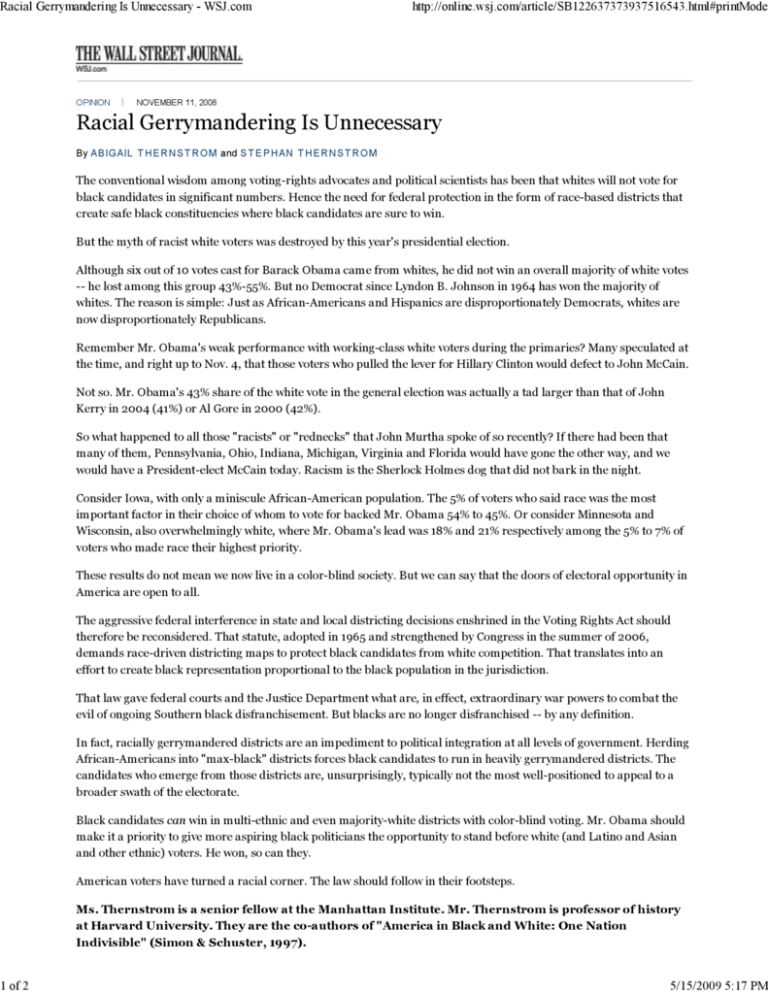
Racial Gerrymandering Is Unnecessary - WSJ.com
1 of 2
OPINION
http://online.wsj.com/article/SB122637373937516543.html#printMode
NOVEMBER 11, 2008
Racial Gerrymandering Is Unnecessary
By ABIGAIL T HERNST ROM and ST E PHAN T HERNST ROM
The conventional wisdom among voting-rights advocates and political scientists has been that whites will not vote for
black candidates in significant numbers. Hence the need for federal protection in the form of race-based districts that
create safe black constituencies where black candidates are sure to win.
But the myth of racist white voters was destroyed by this year's presidential election.
Although six out of 10 votes cast for Barack Obama came from whites, he did not win an overall majority of white votes
-- he lost among this group 43%-55%. But no Democrat since Lyndon B. Johnson in 1964 has won the majority of
whites. The reason is simple: Just as African-Americans and Hispanics are disproportionately Democrats, whites are
now disproportionately Republicans.
Remember Mr. Obama's weak performance with working-class white voters during the primaries? Many speculated at
the time, and right up to Nov. 4, that those voters who pulled the lever for Hillary Clinton would defect to John McCain.
Not so. Mr. Obama's 43% share of the white vote in the general election was actually a tad larger than that of John
Kerry in 2004 (41%) or Al Gore in 2000 (42%).
So what happened to all those "racists" or "rednecks" that John Murtha spoke of so recently? If there had been that
many of them, Pennsylvania, Ohio, Indiana, Michigan, Virginia and Florida would have gone the other way, and we
would have a President-elect McCain today. Racism is the Sherlock Holmes dog that did not bark in the night.
Consider Iowa, with only a miniscule African-American population. The 5% of voters who said race was the most
important factor in their choice of whom to vote for backed Mr. Obama 54% to 45%. Or consider Minnesota and
Wisconsin, also overwhelmingly white, where Mr. Obama's lead was 18% and 21% respectively among the 5% to 7% of
voters who made race their highest priority.
These results do not mean we now live in a color-blind society. But we can say that the doors of electoral opportunity in
America are open to all.
The aggressive federal interference in state and local districting decisions enshrined in the Voting Rights Act should
therefore be reconsidered. That statute, adopted in 1965 and strengthened by Congress in the summer of 2006,
demands race-driven districting maps to protect black candidates from white competition. That translates into an
effort to create black representation proportional to the black population in the jurisdiction.
That law gave federal courts and the Justice Department what are, in effect, extraordinary war powers to combat the
evil of ongoing Southern black disfranchisement. But blacks are no longer disfranchised -- by any definition.
In fact, racially gerrymandered districts are an impediment to political integration at all levels of government. Herding
African-Americans into "max-black" districts forces black candidates to run in heavily gerrymandered districts. The
candidates who emerge from those districts are, unsurprisingly, typically not the most well-positioned to appeal to a
broader swath of the electorate.
Black candidates can win in multi-ethnic and even majority-white districts with color-blind voting. Mr. Obama should
make it a priority to give more aspiring black politicians the opportunity to stand before white (and Latino and Asian
and other ethnic) voters. He won, so can they.
American voters have turned a racial corner. The law should follow in their footsteps.
Ms. Thernstrom is a senior fellow at the Manhattan Institute. Mr. Thernstrom is professor of history
at Harvard University. They are the co-authors of "America in Black and White: One Nation
Indivisible" (Simon & Schuster, 1997).
5/15/2009 5:17 PM
Racial Gerrymandering Is Unnecessary - WSJ.com
2 of 2
http://online.wsj.com/article/SB122637373937516543.html#printMode
Indivisible" (Simon & Schuster, 1997).
Please add your comments to the Opinion Journal forum.
Printed in The Wall Street Journal, page A15
Copyright 2009 Dow Jones & Company, Inc. All Rights Reserved
This copy is for your personal, non-commercial use only. Distribution and use of this material are governed by our Subscriber Agreement and by copyright law.
For non-personal use or to order multiple copies, please contact Dow Jones Reprints at 1-800-843-0008 or visit
www.djreprints.com
5/15/2009 5:17 PM

